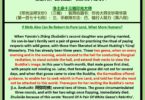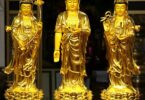◎ 民国 • 朱氏(媳)
People’s Republic [Of China’s] Zhū Shì ([And Her] Daughter-In-Law)
朱氏,适章姓。自幼即敬奉观音大士,深信因果,孝慈乐善。
Zhū Shì followed Zhāng [as her] surname [after marriage]. From young [since, she had] then reverently [made] offerings [to] Guānyīn Bodhisattva Mahāsattva, [with] profound faith [in] cause [and] effect, filial piety [with] loving-kindness, [and] joy [in doing] good.
[Note 1: It is very common in the Chinese community for women to have much affinity with Guānyīn Bodhisattva, perhaps due to her popular female form. However, as below, Zhū Shì later learnt to focus on mindfulness of Buddha in terms of Āmítuófó. There can be association of her to him by remembering that she is his leading disciple, who can also be met in his Pure Land. It should be noted too, that Āmítuófó’s name is shorter and thus easier to be mindful of, even if only in the mind, especially when very sick and weak. His name is also much more commonly used during support-chanting.]
迨六十八岁,闻其子说净土利益,即长斋念佛,历十余年。自发心以来,每早晚,共念佛号一万声,余则随时默念。近二年,因避烦扰,常静坐一室,念佛更加密切。
[It was] until [she was] 68 years [old, that she] heard her son speak [of] Pure Land’s benefits, then [becoming a] lifelong veg[etari]an, [who practised] mindfulness [of] Buddha, passing more [than] ten years. From giving rise [to Aspiration] since, every morning [and] night, [she was] together mindful [of] Buddha’s name [for] ten thousand recitations, [with] others then at any time, [with] silent recitation. Close [to] two years [later], because [of wanting to] avoid [being] disturbed, [she] often quietly sat [in] one room, [practising] mindfulness [of] Buddha even more closely [and] attentively.
[Note 2: Just as one is never too young to do so, it is never too late to become veg(etari)an, and to be mindful of Buddha diligently. With guidance available, even those deceased and reborn can practise them. The older one is, the more diligent daily practice there should be, as one is generally nearer to the date of departure.]
前年抱病,有二三日不食不言,手脉全无,犹能向西静坐,毫无痛苦状。愈后,家人询问当时情境,答谓:「觉坐莲华,心甚愉快。」
[In the] year before the last, [when] being ill, [she] had two [to] three days [that were] without eating [and] without speaking, [yet] still able [to] sit quietly [facing] westwards, not in the least [with the] appearance [of] pain [and] suffering. After healing, [when] family members enquired [on her] situation then, [she] answered saying, ‘[As I] felt [that I was] sitting [on a] lotus flower, [my] mind [was] extremely happy.’
[Note 3: Being very well-practised, despite being sick, she was still able to fast, to silently and blissfully focus on mindfulness of Buddha. To be able to do so like her, we should practise more diligently in everyday life, be we well or sick, to learn to not focus on pain and discomfort from sickness; to focus only on mindfulness of Buddha. It is by doing so that the Buddha’s blessings can be connected to, for transforming suffering to be bliss. As the lotus flower is the vehicle for birth in Pure Land, her statement meant she was ready to be born there.]
至民国近二十年左右之六月间,复患寒热病,其子日率眷属轮班念佛。逝世前一日,向家属曰:「吾尚有一二日,汝等可暂休息,但衣鞋等件,则要换好。」
Until close [to the] sixth month of [the] People’s Republic [of China’s] 20th year [i.e. 1931 C.E.], [when she was] again suffering [from a] cold [and] hot sickness [i.e. Malaria], her son daily led family members [to] take shifts [to] recite [the] Buddha[‘s name. On the] one day before departure, towards [her] family members [she] said, ‘[As] I still have one [to] two days’ [time], you [and] others can temporarily rest, but [my] clothes, shoes [and] other items however, must [be] changed properly [first].’
[Note 4: What directed by her son was support-chanting (助念). Shifts are important for offering periodical rest for support-chanters, who should seamlessly offer support-chanting until departure and beyond, for up to eight hours or more. Roughly knowing in advance when she will be departing, she asked for change of dressing first, so that she can be cleanly and respectfully dressed while departing. Also, there will be no need to touch and move her body much after departure. If the consciousness is still within one’s body after death, touching and moving it can cause magnified pain due to sensitivity increased by nine times.]
至第二日巳刻,即面西端坐,垂目不言。其子复率眷属,环绕念佛。不二十分钟,即安然坐逝,面容怡悦,数小时后,顶犹温。
Until [the] second day’s sì moment [i.e. 10 a.m.], then facing West upright sitting, [she was with] drooping eyes not speaking. Her son again led family members [to] surround [her with] recitation [of the] Buddha[‘s name]. Not [reaching] twenty minutes, [she] then peacefully sat [and] departed, [with her] face [looking] pleasant [and] happy. Several hours later, [her] crown [was] still warm.
[Note 5: She was so well-practised that she could depart seated upright. Those who depart for Pure Land can have the auspicious sign (瑞相) of their facial expression as if well and alive (面相如生). They can also have their heads’ crowns being the last and only spot on their bodies warm (头顶独热), as it is where their consciousness are departing from or has departed from to reach Pure Land. (There are other possible auspicious signs too.)]
最奇者,当朱氏入殓时,其孙女,因哀痛过甚,致昏迷。及醒,云,曾见西方大放光明,观世音菩萨,手执杨枝,率同无数菩萨,从空而至。
That most remarkable, [is that] when Zhū Shì’s [body was being put] into [the] casket, her granddaughter, due [to] grief [and] pain [that was] exceedingly extreme, [they] led [her to] lose consciousness. When awaking, [she] said [she has] already seen [the] Western direction, [to be with] great emission [of] bright light, [as] Guānshìyīn Bodhisattva, [with her] hand holding [a] willow branch, led innumerable Bodhisattvas, together [coming] from [the] sky [to] then reach [them].
[Note 6: When the granddaughter lost consciousness, her mind was as if reset, thus making it easier to have the clear vision above, with the Buddha’s blessings. (It is also possible to have such a vision upon awaking.) She probably had great affinity with Guānyīn Bodhisattva too, thus seeing her. It should be noted that when departing and mindful of Buddha, it is the Buddha who will appear before the person mindful, just as when mindful of a Bodhisattva, it is that Bodhisattva who will appear. It is also possible for the one mindful of appearing with a retinue of other enlightened ones.]
见其母亲(即朱氏之媳某氏,亦于前数年,念佛坐逝,曾经印光法师证明生西),与祖母(即朱氏)相随在后,神情光彩,与生前大不相同,一切景物,庄严灿烂。睹此,哀痛顿忘,中心愉悦,莫可言喻。(俞慧郁钞集)
[She] saw her mother ([who was] then Zhū Shì’s daughter-in-law [of a] certain family name, [who] also several years ago, [with] mindfulness [of] Buddha sat [and] departed, [and] previously [by] Dharma Master Yìnguāng confirmed [to be] born [in the] West[ern Pure Land]), with [her] paternal grandmother ([who was] then Zhū Shì), following each other behind, [with] expressions radiant, with [them when] alive previously, [with] great differences, [while] all [in the] scenery [with its] objects, [were] magnificent [and] brilliant. Seeing this, [her] grief [and] pain [were] suddenly forgotten, [as her] mind within [had] joyfulness, [that] could not [be with] words described. (Yú Huìyù’s Collected Essays)
[Note 7: The granddaughter saw proof of her grandmother’s current reach of Pure Land, along with proof of her mother’s earlier reach of it. Her vision also proved Great Master Yìnguāng’s confirmation to be right. Thus, there was triple confirmation on the efficacy of mindfulness of Buddha for reaching Pure Land. See too, a similar contemporary ‘Related Case’ below.]
评曰:凡生西方者,无论男女老幼,悉成童男相。而此女,仍见其母与祖母之女相者,乃须令其认识,权示原相,非不变作童男也。愿阅者,无庸怀疑致诘。
Commentary: All those born [in the] Western [Pure Land], regardless [of] male [or] female, old [or] young, [will] all become youthful males [in] form. Yet this woman, still saw those female forms of [her] mother with [her] paternal grandmother. [This is] so [as it was] necessary [to] enable them [to be] recognised [by her, thus] skilfully manifesting [their] original forms [only], not [that they did] not change [to] become [with] youthful males [in form]. May readers need not [be with] doubts [that] lead [to] questions [on this].
[Note 8: The youthful forms are that of those in their renewed healthy ‘prime’, without sickness and agedness. In reality, according to the vows of Āmítuófó, all reborn in his Pure Land will be empowered by his blessings to look equally magnificent with the 32 great human’s characteristics. This means that they cannot be differentiated by ordinary beings, who are not in his Pure Land, where all will be able to read minds to know their past lives. Thus, the manifestations with familiar yet different and better forms is to notify of reaching or having reached Pure Land, and to inspire survivors to have greater Faith in mindfulness of Buddha.]
《净土圣贤录》:
(Record [Of] Pure Land’s Noble Sages):
三编:往生女人第四
Third Compilation: Fourth [Section On] Reborn Women
德森撰
Compiled [By] Dé Sēn
Namo Amituofo : Translation and notes by Shen Shi’an
相关公案
Related Case:
Walking To Āmítuófó’s Golden Light
https://purelanders.com/2018/12/02/walking-to-amituofos-golden-light





